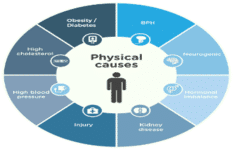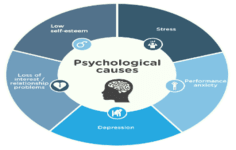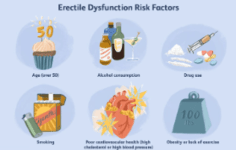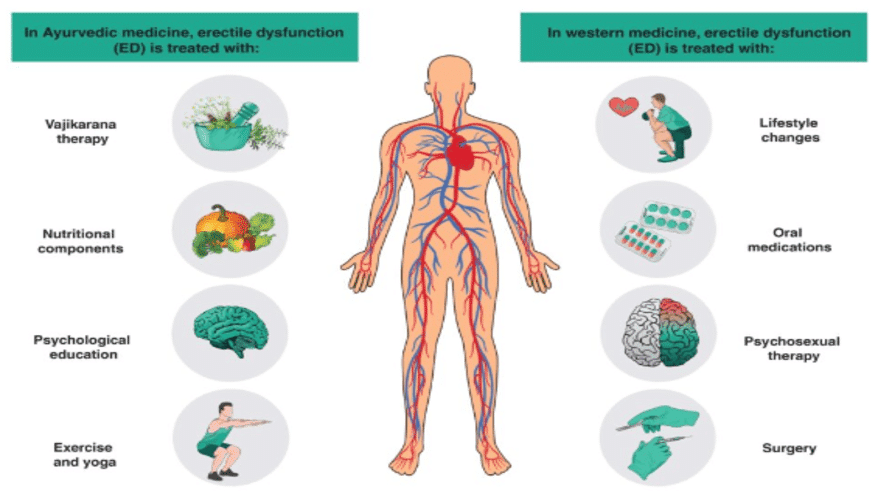Erectile Dysfunction (ED) is a condition that affects millions of men worldwide, yet it often remains a taboo topic. It refers to the inability to achieve or maintain an erection firm enough for sexual intercourse. While occasional difficulty with erections is common, persistent ED can cause stress, affect self-confidence, and strain relationships. Understanding the causes and available treatments for ED is crucial for those affected and their partners.
Understanding Erectile Dysfunction
What Causes Erectile Dysfunction?

Physical Causes: Chronic conditions such as cardiovascular disease and diabetes can damage blood vessels and nerves, impairing blood flow to the penis and affecting erectile function. Hormonal imbalances, particularly low testosterone levels, can also contribute to Erectile Dysfunction. Additionally, neurological disorders, such as multiple sclerosis and Parkinson’s disease, can interfere with the brain’s ability to send signals to initiate and maintain erections.

Psychological Causes: Mental health issues like anxiety, depression, and stress can significantly impact sexual function. Performance anxiety, relationship problems, and past trauma can also contribute to ED by creating emotional barriers to intimacy.
 Lifestyle Factors: Unhealthy habits such as smoking, excessive alcohol consumption, and substance abuse can contribute to ED by impairing blood flow, damaging blood vessels, and disrupting hormonal balance. Obesity and lack of exercise can also increase the risk of ED by exacerbating underlying health conditions.
Lifestyle Factors: Unhealthy habits such as smoking, excessive alcohol consumption, and substance abuse can contribute to ED by impairing blood flow, damaging blood vessels, and disrupting hormonal balance. Obesity and lack of exercise can also increase the risk of ED by exacerbating underlying health conditions.
How Does Erectile Dysfunction Impact Men?
Erectile dysfunction can have far-reaching effects on a man’s physical and emotional well-being. Beyond the frustration of being unable to achieve or maintain an erection, ED can lead to feelings of inadequacy, low self-esteem, and relationship strain. Men may avoid sexual intimacy out of fear of embarrassment or performance anxiety, further exacerbating the problem.
Treating Erectile Dysfunction
Lifestyle Changes
- Adopting a healthier lifestyle is often the first step in managing ED. Regular exercise improves cardiovascular health, promotes weight loss, and boosts mood, all of which can positively impact erectile function. Quitting smoking and moderating alcohol consumption can also improve blood flow and overall vascular health.
- Diet plays a crucial role in managing ED, with a focus on consuming whole foods rich in antioxidants, fiber, and essential nutrients. Avoiding processed foods, sugary drinks, and excessive salt can help maintain optimal cardiovascular health and support erectile function.

Medications
- Phosphodiesterase type 5 (PDE5) inhibitors are the most commonly prescribed medications for ED. These drugs work by increasing blood flow to the penis, facilitating the process of achieving and maintaining an erection. Sildenafil (Viagra), tadalafil (Cialis), and vardenafil (Levitra) are widely used PDE5 inhibitors with proven efficacy.
- Other medications, such as alprostadil and testosterone replacement therapy, may be prescribed in certain cases to address specific underlying causes of ED. These treatments should be discussed with a healthcare provider to determine the most appropriate option based on individual needs and medical history.

Psychotherapy
- Addressing the psychological factors contributing to ED is essential for comprehensive treatment. Therapy or counseling can help individuals identify and address underlying issues such as anxiety, depression, or relationship problems. Cognitive-behavioral therapy (CBT) and sex therapy techniques can help individuals develop coping strategies and improve sexual confidence.
- Couples counseling may also be beneficial for addressing relationship issues and improving communication and intimacy between partners. Open and honest communication about sexual concerns and expectations can help alleviate tension and improve sexual satisfaction.

Alternative Therapies
- Some individuals may explore alternative therapies such as acupuncture, herbal supplements, or mindfulness techniques to manage ED symptoms. While research on the efficacy of these treatments is limited, some people may find them helpful as adjunctive therapies.
- It’s essential to approach alternative therapies with caution and consult with a healthcare professional before incorporating them into an ED treatment plan. Some supplements may interact with medications or have potential side effects that could exacerbate existing health conditions.

Erectile Dysfunction (ED) is a complex condition with various contributing factors, and its treatment involves a multifaceted approach. In addition to the main treatment modalities discussed earlier, there are several additional points to consider when addressing ED:
Regular Physical Activity: Engaging in regular physical activity not only helps improve cardiovascular health but also promotes overall well-being, including sexual function. Exercise can enhance blood flow throughout the body, including to the genital area, which is crucial for achieving and maintaining erections.
Healthy Sleep Patterns: Adequate sleep is essential for hormone regulation and overall health. Poor sleep quality or sleep disorders such as sleep apnea can contribute to hormonal imbalances and increase the risk of ED. Establishing healthy sleep habits can positively impact sexual function.
Stress Management Techniques: Stress is a common contributing factor to ED, and learning stress management techniques can be beneficial. Practices such as mindfulness meditation, deep breathing exercises, and yoga can help reduce stress levels and promote relaxation, potentially improving erectile function.
Communication with Healthcare Providers: Open and honest communication with healthcare providers is crucial for effective ED management. Individuals should feel comfortable discussing their symptoms, concerns, and treatment preferences with their healthcare team. This allows for personalized treatment planning and adjustments as needed.
Exploration of Sexual Techniques: Experimenting with different sexual techniques and activities can help individuals and their partners find alternative ways to experience pleasure and intimacy, even if penetrative intercourse is not possible or desired. Open communication and a willingness to explore can strengthen the bond between partners.
Support Groups and Online Communities: Joining support groups or online communities focused on sexual health and ED can provide individuals with a sense of solidarity and empowerment. Sharing experiences, insights, and resources with others who are facing similar challenges can be reassuring and informative.
Regular Check-ups and Monitoring: Monitoring overall health and addressing any underlying medical conditions or risk factors is essential for managing ED. Regular check-ups with healthcare providers allow for early detection of potential issues and adjustments to treatment plans as needed.
Patience and Persistence: Managing ED may require time, patience, and persistence. It’s essential for individuals and their partners to approach treatment with realistic expectations and to be patient with the process. Celebrating small victories and maintaining a positive outlook can help maintain motivation and progress.
Frequently Asked Questions (FAQs)
Q: What is Erectile Dysfunction (ED)?
A: ED refers to the inability to achieve or maintain an erection sufficient for sexual intercourse. It can result from various factors, including physical conditions, psychological issues, and lifestyle habits.
Q: What causes ED?
A: ED can be caused by underlying health conditions like cardiovascular disease and diabetes, psychological factors such as anxiety and depression, and lifestyle choices like smoking and excessive alcohol consumption.
Q: How is ED diagnosed?
A: Diagnosis typically involves a physical exam, medical history review, and possibly laboratory tests to identify underlying health issues contributing to ED. Additionally, psychological evaluations may be conducted to assess mental health factors.
Q: What are the treatment options for ED?
A: Treatment options for ED include lifestyle changes, such as exercise and dietary modifications, medications like PDE5 inhibitors, hormone therapy, psychotherapy, and alternative therapies like acupuncture. The most suitable treatment varies depending on individual circumstances and underlying causes.
Q: Is ED a normal part of aging?
A: While ED becomes more prevalent with age due to factors like decreased blood flow and hormone levels, it is not an inevitable part of aging. Many older adults maintain healthy erectile function with proper lifestyle habits and appropriate medical interventions.
Conclusion
Erectile Dysfunction is a complex condition with a range of underlying causes, including physical, psychological, and lifestyle factors. Effective management of ED often requires a comprehensive approach, including lifestyle modifications, medications, psychotherapy, and alternative therapies. By addressing the root causes of ED and exploring appropriate treatment options, individuals can regain confidence, improve sexual function, and enhance overall quality of life. Seeking guidance from a healthcare provider is essential for personalized treatment planning and ongoing support in managing ED.
Take control of your sexual health. Schedule your appointment today at Patients Medical and start your journey towards overcoming erectile dysfunction. Our experienced healthcare professionals are here to provide personalized care and support. Don’t wait any longer – reclaim your confidence and intimacy!
Schedule your appointment today at 1-212-794-8800 or email us at info@patientsmedical.com
Our medical center is in New York City.
Patients Medical PC
1148 Fifth Avenue, Suite 1B
New York, NY 10128

Rashmi Gulati, MD, provides innovative, individualized health care that nurtures mind, body, and spirit. Since 2004 she has been the medical director at Patients Medical, where she delivers comprehensive personalized health care, treating each patient as a respected, unique individual. Through their integrative health care center in the heart of Manhattan, Dr. Gulati and her colleagues have become premier care providers serving patients locally and throughout the world.
About Patients Medical
PatientsMedical.com is headed by Rashmi Gulati, MD who is a board-certified physician with over 20 years of integrative, functional and internal medicine experience.
Patients Medical is a holistic wellness center dedicated to helping its clients discover health and rediscover vitality. Their physicians combine the best of conventional and holistic medicine with state-of-the-art equipment to provide comprehensive care and treatment to their patients. They focus on the root causes of secondary medical conditions, integrating modern medicine, holistic practices, and natural supplements to fast-track healing and prevent disease. Every year, thousands of existing and new patients continue to visit the center, seeking an alternative medical approach to a variety of health issues.
In addition, Patients Medical provides access to over 15,000 affordable supplements on their affiliated website: www.MySupplements.Store
Our medical center in New York City.
Patients Medical PC
1148 Fifth Avenue, Suite 1B
New York, NY 10128

